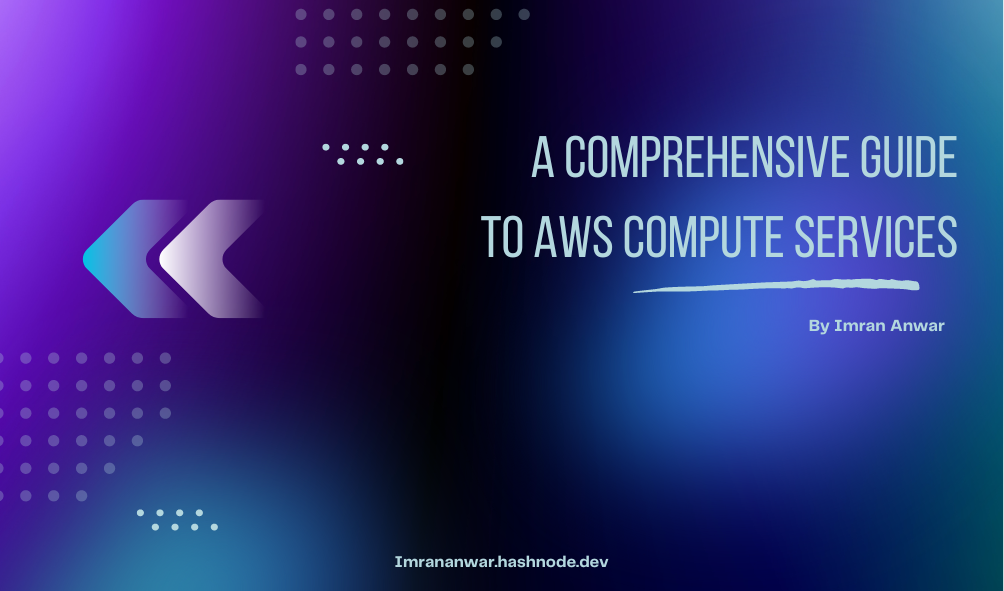A Comprehensive Guide to AWS Compute Services: Your Gateway to Scalable Cloud Solutions
 Imran Anwar
Imran Anwar
AWS Compute Services:
In today’s rapidly evolving digital landscape, businesses need reliable, scalable, and cost-effective computing solutions to stay competitive. Amazon Web Services (AWS) provides a suite of powerful compute services that cater to various needs, from simple web applications to complex machine learning models. In this blog post, we’ll delve into the key AWS compute services, highlighting their features and benefits.
1. Amazon Elastic Compute Cloud (EC2)
Amazon EC2 is the cornerstone of AWS compute services, offering resizable virtual servers in the cloud. EC2 allows businesses to scale their infrastructure as needed, making it an ideal choice for both startups and large enterprises.
Scalability: Easily scale your infrastructure up or down based on demand.
Variety of Instance Types: Choose from a wide range of instance types optimized for different workloads.
Elastic Block Store (EBS): Persistent block storage for your data.
Auto Scaling: Automatically adjust the number of instances during demand spikes.
2. AWS Lambda
AWS Lambda revolutionizes computing by enabling you to run code without provisioning or managing servers. It’s a fully managed service that automatically scales your applications by running code in response to triggers such as changes in data or user requests.
Serverless: No need to manage infrastructure.
Event-Driven: Executes code in response to events.
Automatic Scaling: Scales automatically from a few requests per day to thousands per second.
Cost-Efficient: Pay only for the compute time you use.
3. Amazon Elastic Container Service (ECS)
Amazon ECS is a highly scalable container orchestration service that supports Docker containers, making it easy to run and manage containerized applications.
Integration with AWS Services: Seamlessly integrates with services like IAM, CloudWatch, and VPC.
Task Definition: Simplifies the management of containerized applications.
Cluster Management: Efficiently manage and scale clusters of EC2 instances.
Fargate Launch Type: Run containers without managing servers or clusters.
4. Amazon Elastic Kubernetes Service (EKS)
Amazon EKS is a managed service that makes it easy to run Kubernetes on AWS without needing to manage your own Kubernetes control plane.
Managed Service: Fully managed Kubernetes control plane.
High Availability: Reliable and scalable infrastructure.
Security: Integrated with AWS Identity and Access Management (IAM).
Integration: Works seamlessly with other AWS services.
5. AWS Fargate
AWS Fargate is a serverless compute engine for containers that works with both Amazon ECS and Amazon EKS, allowing you to focus on designing and building applications without managing infrastructure.
Serverless: No need to manage underlying infrastructure.
Seamless Integration: Compatible with ECS and EKS.
Cost-Efficiency: Pay only for the resources you use.
Focus on Applications: Allows developers to concentrate on building applications.
6. AWS Batch
AWS Batch enables efficient running of batch computing workloads on the AWS Cloud. It dynamically provisions the optimal quantity and type of compute resources based on the volume and specific resource requirements of the batch jobs submitted.
Managed Service: Automatically provisions the right compute resources.
Job Scheduling: Efficiently schedules jobs to run in the optimal environment.
Scalability: Automatically scales batch computing workloads.
Cost-Effectiveness: Utilizes Spot Instances and EC2 to reduce costs.
7. Amazon Lightsail
Amazon Lightsail is the easiest way to launch and manage a virtual private server with AWS. It includes everything you need to jumpstart your project.
Simplified Interface: User-friendly interface for quick setup.
Pre-Configured Blueprints: Quick deployment with pre-configured blueprints.
Integrated Networking: Includes DNS management, static IPs, and more.
Cost Predictability: Monthly pricing plans for predictable billing.
8. AWS Outposts
AWS Outposts bring the same AWS infrastructure, services, APIs, and tools to virtually any data center or on-premises facility for a truly consistent hybrid experience.
Hybrid Cloud: Extends AWS services to on-premises locations.
Consistent Environment: Uses the same hardware and services as AWS regions.
Low Latency: Ideal for applications requiring low-latency access to on-premises systems.
Managed Service: Fully managed by AWS.
9. AWS Elastic Beanstalk
AWS Elastic Beanstalk simplifies the deployment and scaling of web applications and services developed with popular languages and frameworks such as Java, .NET, PHP, Node.js, Python, Ruby, Go, and Docker.
Platform as a Service (PaaS): Simplifies deployment and management.
Environment Management: Manages infrastructure, including capacity provisioning, load balancing, and auto-scaling.
Monitoring: Provides health monitoring and detailed performance metrics.
Quick Deployment: Fast deployment with minimal setup.
Conclusion
AWS Compute Services offer a comprehensive range of options to meet diverse computing needs. Whether you’re developing a simple web application or managing large-scale enterprise workloads, AWS provides scalable, reliable, and cost-effective solutions. Embrace the power of the cloud with AWS Compute Services and transform your business operations.
Subscribe to my newsletter
Read articles from Imran Anwar directly inside your inbox. Subscribe to the newsletter, and don't miss out.
Written by

Imran Anwar
Imran Anwar
"My name is Imran Anwar, currently a third-year BTech student majoring in Computer Science and Engineering. While I am still in the process of gaining professional experience, my ambition is to excel as a DevOps Engineer specializing in cloud infrastructure. I have a keen interest and foundational knowledge in AWS, with aspirations to design, implement, and manage highly scalable architectures using core services such as EC2, S3, RDS, and Lambda. I am proficient in infrastructure as code tools like Terraform and CloudFormation and have hands-on experience setting up CI/CD pipelines using Jenkins and AWS CodePipeline. Additionally, my skills extend to container orchestration using Docker and Kubernetes, and I have implemented robust monitoring solutions using CloudWatch and Elasticsearch. I pride myself on being a quick learner and a problem solver, consistently seeking opportunities to expand my skill set and tackle challenges head-on. My strong communication and collaboration skills enable me to effectively engage with cross-functional teams, including developers and operations personnel. I am deeply passionate about cloud computing and am eager to leverage AWS services to drive innovation and deliver impactful business outcomes."